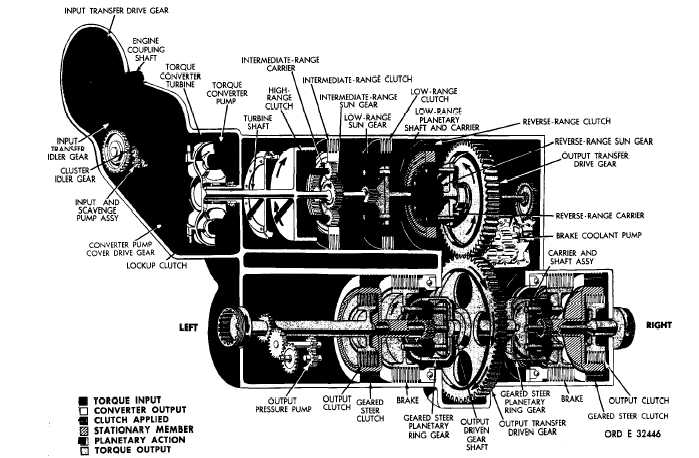C H A P 2, SEC V
T O R Q U E P A T H S
PAR 5 1
51. TORQUE PATH – REVERSE 1 GEAR,
CONVERTER OPERATION (fig. 27)
a . T o r q u e i s t r a n s m i t t e d t o t h e t u r b i ne
shaft in the manner described in pars. 42 and
43, above. In reverse range, torque is trans-
mitted from the turbine shaft to the output
t r a n s f e r d r i v e g e a r b y a c o m p o u n d a r r a n g e-
m e n t o f t h e r e v e r s e - r a n g e a n d l o w - r a n ge
p l a n e t a r y g e a r s.
b . The input member of this compound ar-
rangement is the low-range sun gear. Torque
is transmitted to the low-range pinions which
rotate in the direction opposite the sun gear.
T h e s l o w e r m o v i n g , l o w - r a n g e c a r r i e r , a l-
though it is rotating, is a reaction member.
T h e l o w - r a n g e r i n g g e a r , m e s h e d w i t h i ts
pinions, rotates in the direction opposite the
sun gear. Thus, the reversal of rotation ac-
tually occurs in the low-range planetary.
Figure 27. Reverse 1-gear torque path, converter operation
c . T h e r e v e r s e - r a n g e s u n g e a r i s a t-
tached to the low-range ring gear and rotates
with it. The reverse-range clutch is engaged,
holding the reverse-range ring gear stationary.
T h e r e v e r s e - r a n g e p l a n e t a r y p i n i o n s a r e in
mesh with both the ring gear and sun gear.
T h e r o t a t i o n o f t h e r e v e r s e - r a n g e s u n g e ar
forces the pinions to rotate within the station-
ary ring gear. This drives the reverse-range
c a r r i e r i n t h e s a m e d i r e c t i o n a s , b u t a t a
slower speed than, the sun gear. The reverse-
range carrier, splined to the low-range plane-
tary carrier shaft, drives the output transfer
d r i v e g e a r.
d . T h e r e m a i n d e r o f t h e t o r q u e p a t h is
i d e n t i c a l t o t h a t d e s c r i b e d f o r f i r s t g e a r in
par. 47b and c, a b o v e . R e f e r t o T A B U L A T ED
D A T A , p a r . 7 , f o r g e a r r a t i o s a p p l i c a b l e to
r e v e r s e 1 g e a r.
5
4
|
|




